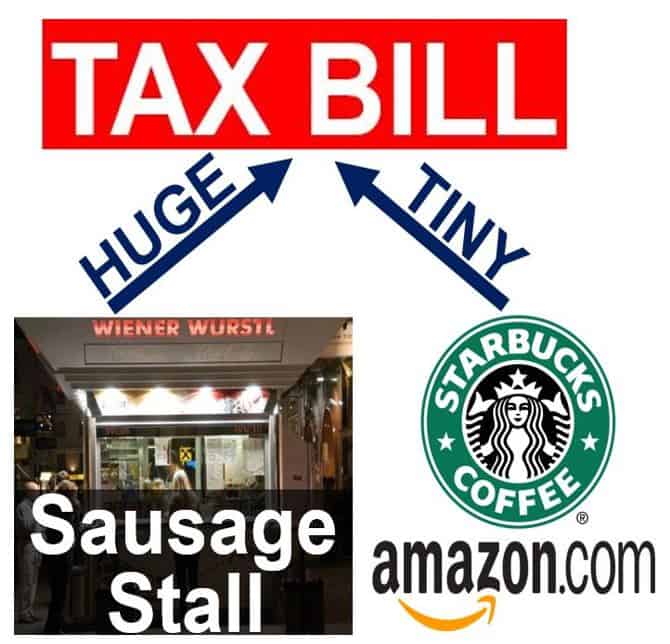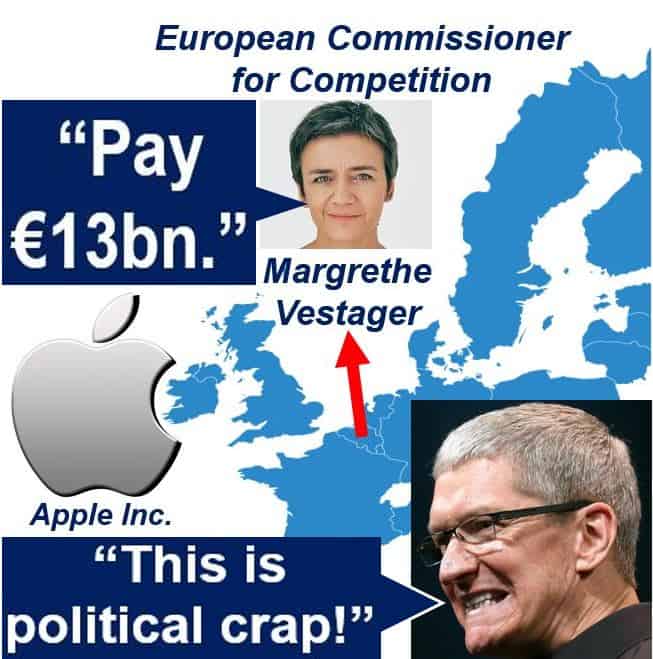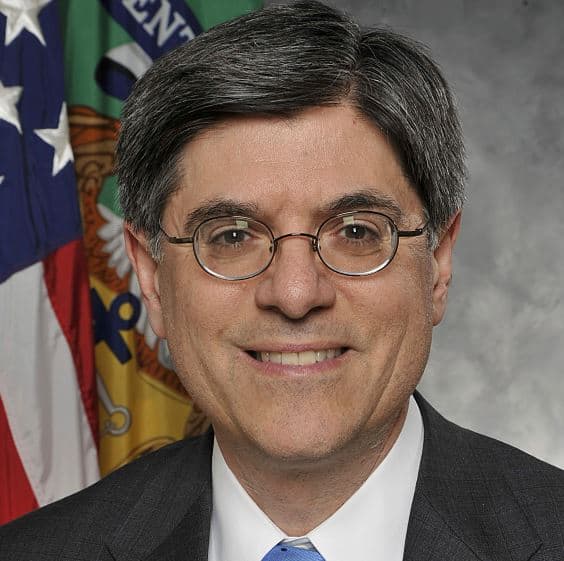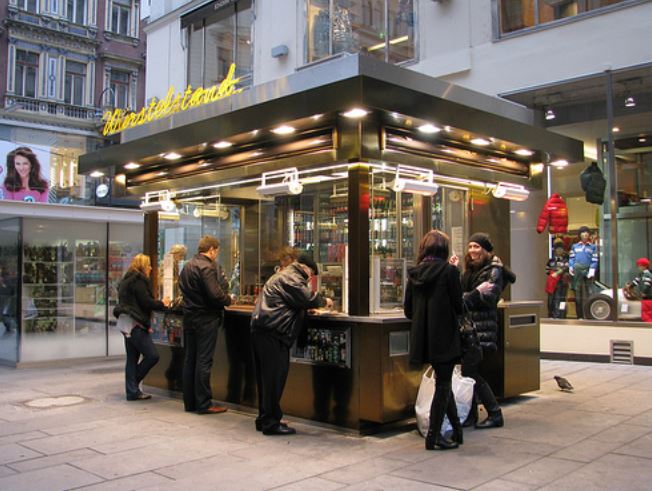Austrian sausage stalls pay more tax than Starbucks, Amazon and other multinational corporations, said Christian Kern, who is Chancellor of Austria and chairman of the Social Democratic Party of Austria (SPÖ).
Most Viennese cafés also pay more each year in tax than the majority of giant, multinational corporations, he added in an interview with Der Standard.
Mr. Kern said:
“Every Viennese cafe, every sausage stand pays more tax in Austria than a multinational corporation. That goes for Starbucks, Amazon and other companies.”
 Why should a simple, stand-alone sausage stall pay more tax than corporate giants Starbucks and Amazon.com, the Austian Chancellor asks.
Why should a simple, stand-alone sausage stall pay more tax than corporate giants Starbucks and Amazon.com, the Austian Chancellor asks.
Mr. Kern believes that the very structure of the European Union is undermined by member states that have extremely low corporate tax rates. Ireland, Luxembourg and the Netherlands are corporate magnets because their tax rates are considerably lower than those of other EU countries, and nearly seventy percent less than the corporate tax rate in the United States.
Mr. Kern said:
“What Ireland, the Netherlands, Luxembourg or Malta are doing here lacks solidarity towards the rest of the European economy.”
Unfair on sausage stalls and other businesses
Why should mega-huge global corporations be allowed preferential treatment, when sausage stalls, cafés and other small and medium-sized enterprises (SMEs) have to pay considerably more tax, he asked.
Mr. Kern praised a recent European Commission ruling which ordered the American multinational technology company Apple Inc. to pay €13 billion (£11 bn or $14.5bn) more in corporate tax to the Irish government.
 Apple CEO Tim Cook described the European Commissioner’s ruling as ‘Political Crap’. Apple has to pay the Irish government €13 billion in taxes.
Apple CEO Tim Cook described the European Commissioner’s ruling as ‘Political Crap’. Apple has to pay the Irish government €13 billion in taxes.
European Union citizens, especially eurosceptics, resent the massive tax breaks multinational companies manage to get away with, while they are clobbered by their tax authorities for having to plug the shortfall.
During the referendum campaign in the UK, which resulted in a Brexit vote in June, the anti-EU party UKIP accused Brussels and all it stood for of pandering to the desires and whims of the corporate and bureaucratic world, and being completely out of touch with its individual citizens.
According to Mr. Kern, Google and Facebook had sales exceeding €100 million in Austria, paid virtually no Austrian tax or advertising duty, but sucked up most of the country’s advertising volume.
Mr. Kern explained:
“They massively suck up the advertising volume that comes out of the economy but pay neither corporation tax nor advertising duty in Austria.”
Kern praised Apple Inc. ruling
Earlier this week, Margrethe Vestager, the European Competition Commissioner, ruled that Apple owes Ireland €13 billion in taxes. The US multinational was accused of paying just 0.005% tax in Ireland in 2014.
Ms. Vestager said Apple received preferential treatment in Ireland – the equivalent of a €13 billion subsidy.
Apple’s CEO, Tim Cook, accused the Commission of ‘political crap’, claiming that Ireland was a pawn in the Commission’s wider plan to harmonise taxes across the EU.
Both Apple and Ireland’s government say they plan to appeal against the ruling.
 Jack Lew, the US Treasury Secretary, claims that the European Commission is picking on American companies for tax investigations. “I have raised the issue that the pattern of the action appears to be highly focused on U.S. firms. They point to some small actions against non-U.S. firms, but the largest actions do appear to be aimed squarely at our tax base,” he said. (Image: www.treasury.gov)
Jack Lew, the US Treasury Secretary, claims that the European Commission is picking on American companies for tax investigations. “I have raised the issue that the pattern of the action appears to be highly focused on U.S. firms. They point to some small actions against non-U.S. firms, but the largest actions do appear to be aimed squarely at our tax base,” he said. (Image: www.treasury.gov)
Mr. Cook, in an interview with Independent.ie, said:
“I think we’ll work very closely together, as we have the same motivation. No one did anything wrong here and we need to stand together. Ireland is being picked on and this is unacceptable. It’s total political crap.”
“They just picked a number from I don’t know where. In the year that the Commission says we paid that tax figure, we actually paid $400m. We believe that makes us the highest taxpayer in Ireland that year.”
Ms. Vestager said that over a ten-year-period, Apple had improperly routed taxable revenue into a subsidiary that has no employees or a physical office anywhere in the world.
Tim Cook and the Irish government insist they have ‘played by the rules’ and are sure they will win the case on appeal.
Mr. Cook, who accuses the Commission of playing politics, said:
“I can’t see another explanation for it. So I think it clearly suggests that this is politics at play.”
Rather than pick on its smaller member states and organize these witch-hunts against US corporations, the Commission should invite public discussion if it seeks to harmonize tax systems across the US, Mr. Cook suggested.
US Secretary to the Treasury, Jack Lew, said the Commission’s retroactive €13 billion tax bill ruling is an attempt to grab taxes that are actually owed to the United States Treasury.
Virtually all EU media sources and legal experts are sure this is a political move. However, many say it is not a case of the Commission having it in for corporate America, but rather one of showing its citizens that it is acting in their interests. Perhaps, by forcing multinationals to pay their fair share of taxes, the eurosceptics’ arguments will seem hollow.
Austrian sausage stalls
Austrians say that sausage stalls are their response to fast food and hot dog stalls, and a firm part of their culture since WWI.
 You can find sausage stalls all over the Austrian capital. (Image: mytravelsinart.com)
You can find sausage stalls all over the Austrian capital. (Image: mytravelsinart.com)
The sausage stalls serve Vienna beef hotdogs or a range of other sausages, with spices or cheese, on a paper plate, with a white bread roll (Semmel) or a couple of slices of dark bread.
Sausage stalls can be found all over the Austrian capital Vienna, especially in its downtown areas.
The capital’s most famous sausage stand is Bitzinger’s Würstelstand. It is always extremely busy, especially after opera performances.
The high season for sausage stalls is from January to March. However, stalls are feeling the pressure from multinational fast food chains.
